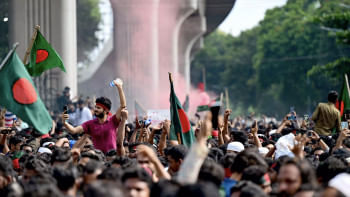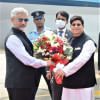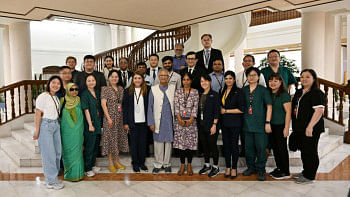Why Dhaka-Delhi relations aren't like Washington-London

I believe that the relationship between Dhaka and Delhi could have been as strong as the one between Washington and London. The Washington-London relationship is special, characterised by mutual respect and trust. But it is difficult to imagine America interfering in Britain's internal affairs, or those of France or Germany.
Why isn't there a similar relationship between India and Bangladesh? The short answer is that India has shown a tendency to dominate and take more benefits from Bangladesh than it is willing to give back in return. India often prioritises its own interests over Bangladesh's legitimate needs. This mindset has existed since before India's independence in 1947.
In March 1946, the Labour government under Prime Minister Clement Attlee sent a Cabinet Mission to India to address the country's complex constitutional issues. The Cabinet Mission rejected the idea of Pakistan, instead proposing a federal India with three groups: Group A (present-day India), Group B (present-day Pakistan), and Group C (Bengal and Assam). The Muslim League accepted this plan, but the Congress, led by Jawaharlal Nehru, rejected it, seeking a united India, which would mean under Hindu majority rule. Historians agree that the Cabinet Mission plan could have been the best solution, potentially avoiding partition and subsequent wars, and creating a subcontinent similar to Western Europe. Moreover, present-day India would have been the leader of the group. However, that was not to be because of the narrow mindset of the Congress.
Unfortunately, the same Indian attitude persists today. Over the past 15 years, India has supported a brutal dictatorship in Bangladesh, disregarding the will of the Bangladeshi people by stage managed elections. This led to widespread anti-India sentiment.
Our relationship with India depends on whether Bangladesh has a democratic or undemocratic government. It was shameful when the de facto head of Bangladesh's interim government in 2007, Moin U Ahmed, asked Indian leader Pranab Mukherjee to secure his position. It was even more disgraceful when a foreign minister under Sheikh Hasina publicly asked India to help keep Hasina in power, as if Bangladesh were an Indian colony. Sheikh Hasina herself has declared, "I have given so much to India that they will remember it forever," implying that her duty as prime minister was to protect India's interests. This mentality has led to a belief that Bangladesh cannot survive without appeasing India. However, on August 5, this was proven wrong by our people, led by young students.
We have granted India transit and transshipment rights. However, the nation remains unaware of the benefits gained in return, despite the past government's claim that this would transform Bangladesh into a new Singapore. Furthermore, the public is largely unaware of the terms and conditions of many treaties signed with India, even though Article 145A of our constitution requires all treaties to be presented before parliament.
We are a nation of 173 million people. Our strength lies in our national unity, democracy, judicial independence, rule of law, economic development, and constitutionalism. By preserving these values, we can engage with any regional or global power with honour and dignity.
Our relationship with India has faced significant challenges over the years. In May 1975, the Indian government initiated the Farakka Barrage project as a "trial run" by misleading the Mujib government. This "trial run" has continued for 50 years, causing severe ecological damage, particularly in the Rajshahi region of northeastern Bangladesh. The once-mighty Padma River has dried up over many miles, and the current generation has no idea of its former grandeur. Additionally, we have been deprived of our fair share of the Teesta water, which is now a point of contention between China and India.
We have granted India transit and transshipment rights. However, the nation remains unaware of the benefits gained in return, despite the past government's claim that this would transform Bangladesh into a new Singapore. Furthermore, the public is largely unaware of the terms and conditions of many treaties signed with India, even though Article 145A of our constitution requires all treaties to be presented before parliament. We suffer losses in border and international trade with India, and the Indian Border Security Force frequently kills our citizens at the border with impunity.
It is widely known that India's foreign policy towards Bangladesh is primarily shaped by its intelligence agency, RAW, which is problematic.
We desire a good neighbourly relationship with India, based on equality and mutual respect between two sovereign nations. We do not want a repeat of the past government's submissive foreign policy towards India. Our politicians should recognise that India is not monolithic and should engage with its diverse society to benefit Bangladesh. They need to develop the confidence to do so.
Once we have our internal affairs in order, we should reevaluate and renegotiate all the clauses in our agreements and treaties with India, to see if they truly serve our national interests.
Historically, the Indian political leadership has sought to take more advantage of its neighbouring countries than it's willing to give back, leading to poor and sometimes sour relationships. This will not benefit India in the long run, and the sooner India realises this, the better it will be for India, its people, and its neighbouring countries in the Himalayan subcontinent.
Abdur Razzaq is a senior advocate of Bangladesh Supreme Court and currently practises law in the United Kingdom.
Views expressed in this article are the author's own.
Follow The Daily Star Opinion on Facebook for the latest opinions, commentaries and analyses by experts and professionals. To contribute your article or letter to The Daily Star Opinion, see our guidelines for submission.

 For all latest news, follow The Daily Star's Google News channel.
For all latest news, follow The Daily Star's Google News channel. 










Comments